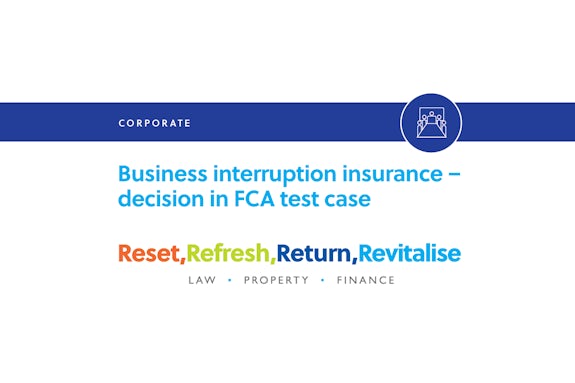By Gilson Gray
March 5, 2021

As a result of the COVID-19 pandemic, the UK Government closed the doors of many businesses, particularly in the hospitality industry. This led to many of the affected businesses submitting claims under their business interruption insurance for financial loss.
Many insurers took the view that business interruption policies were neither designed nor intended to deal with a worldwide pandemic and rejected the claims. This was brought to the attention of the Financial Conduct Authority, who had concerns about the uncertainty and decided to bring proceedings as a test case in the High Court in England. The test case involved 21 different wordings of business interruption policies and was brought against 8 insurers. The wordings fell into three categories:
The High Court last week gave its highly-anticipated judgment, which it is estimated will affect up to 370,000 businesses.
The decision
The Court found in favour of the FCA on most of the key issues.
For disease wordings, the Court considered that claims should be accepted where the pandemic itself was the cause of the loss suffered by the business within the meaning of the policy.
For prevention of access wordings, the Court considered that where denial of access to premises was a trigger for cover, most (but not all) of the policies considered should provide cover.
Effects of the judgment
The judgment is binding on the eight insurers involved in the action. However, it is important to note that this is only in relation to the specific policy wordings considered. Uncertainty may still arise where a policy holder has cover with an insurer not involved in the test case or where the holder has a policy with different wording.
It is also worth noting that the insurers will take their time to consider this judgment and may yet choose to appeal.
What does this mean for businesses with business interruption cover?
If a business has already made a claim, it should be contacted directly by its insurers following the judgment. The judgment relates specifically to the twenty one policy wordings that the Court considered and variations of these wordings may lead to varied treatment of claims. In any event, businesses with business interruption cover should review their policy wording in light of the decision.
If you would like further information on the topic discussed in this blog, please contact:
Derek Hamill by email: dhamill@gilsongray.co.uk or by phone: 07973 924 333 / 0141 530 2022.
Joanna Millar by email: jmillar@gilsongray.co.uk or by phone: 07495 852 592 / 0141 370 8116.
You can also visit our Corporate Team page by clicking here.
The information and opinions contained in this blog are for information only. They are not intended to constitute advice and should not be relied upon or considered as a replacement for advice. Before acting on any of the information contained in this blog, please seek specific advice from Gilson Gray.

Derek specialises in advising owner-managers in connection with finance, contracts and structural issues and has exceptional knowledge of international contract law.